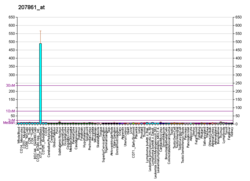CCL22
La quimiocina (motiu C-C motiu) lligand 22 (CCL22) és una petita citocina pertanyent a la família CC de quimiocines, també és coneguda amb altres diversos noms, que inclouen llos de quimiocina macròfag-deriva (MDC) i proteïna quimiotàctica de cèl·lules T estimulades (STCP-1). Es tracta d'un quimioatrallent per cèl·lules T, monòcits, cèl·lules dentrítiques derivades de monòcits, i cèl·lules NK activades.[4][5] La CCL22 és secretada per cèl·lules dendrítiques i macròfags i obtenen un efecte en les seves cèl·lules diana mitjançant la interacció amb receptors de quimiocines en la superfície cel·lular, com el receptor CCR4.[6][7] El gen que codifica la CCL22 es localitza en el cromosoma 16 en humans, en un cluster amb altres quimiocines anomenades CX3CL1 i CCL17[8][9]
Referències
[modifica]- ↑ 1,0 1,1 1,2 GRCh38: Ensembl release 89: ENSG00000102962 - Ensembl, May 2017
- ↑ «Human PubMed Reference:». National Center for Biotechnology Information, U.S. National Library of Medicine.
- ↑ «Mouse PubMed Reference:». National Center for Biotechnology Information, U.S. National Library of Medicine.
- ↑ Godiska et al. Human macrophage-derived chemokine (MDC), a novel chemoattractant for monocytes, monocyte-derived dendritic cells, and natural killer cells. J. Exp. Med. 185:1595-1604 (1997).
- ↑ Chang et al. Molecular cloning and functional characterization of a novel CC chemokine, stimulated T cell chemotactic protein (STCP-1) that specifically acts on activated T lymphocytes. J. Biol. Chem. 272:25229-25237 (1997).
- ↑ Vulcano et al. Dendritic cells as a major source of macrophage-derived chemokine/CCL22 in vitro and in vivo. Eur. J. Immunol. 31:812-822 (2001).
- ↑ Imai et al. Macrophage-derived chemokine is a functional ligand for the CC chemokine receptor 4. J. Biol. Chem. 273:1764-1768 (1998).
- ↑ Loftus et al. Genome duplications and other features in 12 Mb of DNA sequence from human chromosome 16p and 16q. Genomics 60:295-308 (1999).
- ↑ Nomiyama et al. Human chemokines fractalkine (SCYD1), MDC (SCYA22) and TARC (SCYA17) are clustered on chromosome 16q13. Cytogenet. Cell Genet. 81: 10-11 (1998).


